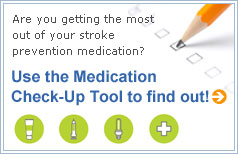|
I want to learn more about Stroke risk reduction I have atrial fibrillation (AFib) and want to learn more about stroke risk reduction I have high blood pressure and want to learn more about stroke risk reduction I have high cholesterol and want to learn more about stroke risk reduction I have diabetes and want to learn more about stroke risk reduction I have had a stroke or TIA ("mini-stroke") and want to reduce the risk of another stroke 
Talking to your doctorWorking with your doctor is an important part of managing your risk of stroke. Be prepared and learn how to talk to your doctor. What is the best way to work with my doctor?Want to lower your stroke risk? Your doctor can help. Find out how:
How your doctor can help you reduce stroke riskHere's how your doctor can help in your fight against stroke:
Talk to your doctor about your stroke risk and how you can work together to reduce it. When to see your doctor about stroke riskIf you have high cholesterol, it's a good idea to talk to your doctor about your stroke risk, especially if:
Contact your doctor to discuss your stroke risk. How to get the most out of seeing your doctorYou may only have a short time in your doctor's office. Here are the top 5 ways to make the most of it:
|
|
||||||||||||||||||||||||||||||||||||||||||||||||||||||||||||||||||||||||||||||||||||||||||||||||||||||||||||||||||||||||||||||||||||||||||||||||||||||||||||||||||||||||||||||||||||||||||||||||||||||||||||||||||||||||||||||||||||||||||||||||||||||||||||||||||||||||||||||||||||||||||||||||||||||||||||||||||||||||||||||||||||||||||||||||||||||||||||||||||||||||||||||||||||||||||||||||||||||||||||||||||||||||||||||||||||||||||||||||||||||||||||||||||||||||||||||||||||||||||||||||||||||||||||||||||||||||||||||||||||||||||||||||||||||||||||||||||||||||||||||||||||||||||||||||||||||||||||||||||||||||||||||||||||||||||||||||||||||||||||||||||||||||||||||||||||||||||||||||||||||||||||||||||||||||||||||||||||||||||||||||||||||||||||||
|
Hot Topics -
Bedwetting,
Depression,
Flu (Seasonal),
Healthy Skin,
Incontinence,
Multiple Sclerosis,
Psoriasis,
Stroke Risk Reduction
|
||
| Condition and disease information is written and reviewed by the MedBroadcast Clinical Team. |
||
|
|
The contents of this site are for informational purposes only and are meant to be discussed with your physician or other qualified health care professional before being acted on. Never disregard any advice given to you by your doctor or other qualified health care professional. Always seek the advice of a physician or other licensed health care professional regarding any questions you have about your medical condition(s) and treatment(s). This site is not a substitute for medical advice. © 1996 - 2024 MediResource Inc. - MediResource reaches millions of Canadians each year. |
|





